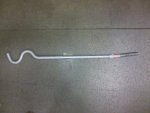AAHHH...that's what I was concerned about. How thick is the pad you have the generator setting on?
If your pad is only about 4" thick or so, the problem being this...the "S" shape on the bottom of that bolt is in the ground, not the concrete...and only the smooth shaft of the bolt is going through the concrete. The concrete has nothing to grab onto, and since the steel of the bolt and concrete have different expansion rates, over time with temperature changes the shaft of that bolt will get loose in the concrete. I don't know what the soil is like where you live, but if it is sandy soil, the bolt will become loose over time. I doubt you'll notice it since the generator is so heavy and more than likely will never move. It's just my personal preference, but I like to use floor bolts or other concrete anchors for stuff like that, or some type of "J" bolt that the hook part will be embedded in the concrete, so it will never move or come loose.



